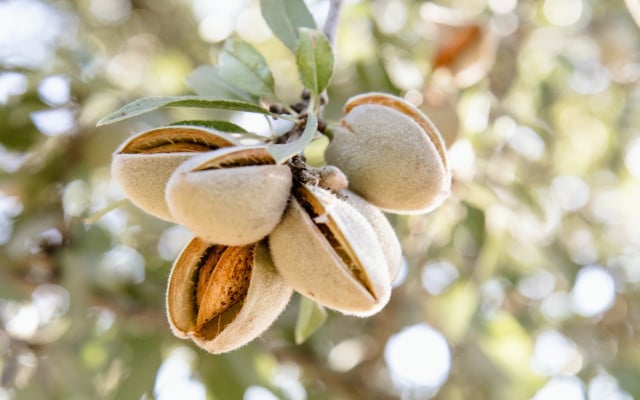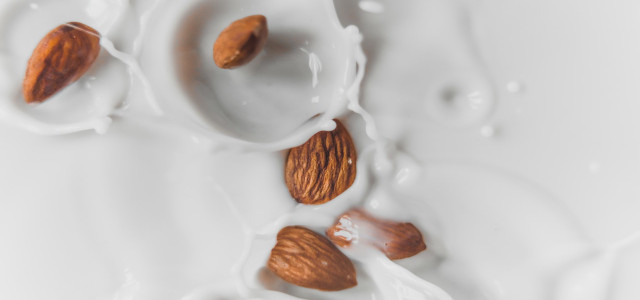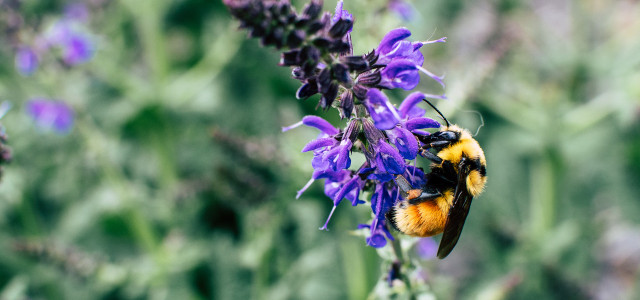Almond milk is known for being a very nutritious plant-based beverage, but is it vegan? In this guide, we’ll take a closer look at the role bees play in this dairy-milk alternative to find out if it’s vegan or not.
Non-dairy milks have become increasingly popular among Americans in the last decade, especially almond milk. According to a report by Mintel, almond milk accounts for 64 percent of the market share in American households. Considering how many other dairy-free milk alternatives there are, it’s an impressive share of the market.
Almond Milk: Uses and Benefits

Almond milk is a creamy plant-based beverage with a subtle nutty flavor that is made by blending up soaked almonds and straining out the pulp. Several brands that are sold in grocery stores come in a variety of flavors including natural, unsweetened, vanilla, and chocolate. Many consider almond milk to be the closest in texture and flavor to dairy milk, which is why it can be used for baking, cereal, in smoothies, and for drinking.
While almonds are known to have some great health benefits, those same benefits are not always extended to almond milk. If manufacturers use blanched or skinless almonds and then strain off the pulp, much of the fiber and antioxidants may be lost. In addition, you aren’t getting the concentrated source of nutrients as you would by eating almonds because almond milk is diluted with water.
Almond milk is still a great alternative to conventional dairy milks as it is lower in calories, higher in calcium, and doesn’t exploit animals. Many brands also enrich their almond milk with vitamins, minerals, or protein, however in order to keep it healthy, skip the flavoured and sweetened options. Some of them can contain up to 17 grams of sugar per serving, which isn’t exactly the healthiest option. If you make your own almond milk, you’re able to skip the stabilizers and added sugars by keeping it natural – just almonds and water.
Is Almond Milk Vegan?
Strictly speaking, almond milk is a plant-based beverage meaning it is definitely vegan and safe to consume for anyone following a vegan diet. When purchasing commercially produced varieties, just pay attention to the added vitamins, emulsifiers and stabilizers. If vitamin D is added, you’ll want to make sure it’s vitamin D2 (always vegan) instead of D3 (sometimes vegan).
Veganism often describes a way of living that attempts to exclude all forms of animal exploitation and cruelty in all aspects of life. There is a lot of this that is open to interpretation, which is where things start to get a bit complicated. The controversy regarding almond milk comes into play when you take the role of bees into consideration.
Almonds and the Bee Problem



Bees are responsible for a lot of foods we enjoy, which is why the USDA considers honeybees to be livestock. If bees disappeared, a surprising amount of crops would cease to exist — including almonds! Bees are dying off at alarming rates across the country, and while the almond industry isn’t entirely to blame, it certainly isn’t helping. 80 percent of global almond production takes place in California, which requires a ton of honeybees – more than exist in California. Therefore honeybees are shipped all over the country during pollinating season, but many of them return worse for wear at the end of pollinating season. There are two main reasons for that:
-
Monocultures
Almonds are grown in monocultures, which is the cultivation of a single crop in any given area. These can be detrimental to the environment due to degradation of soil quality and fertility, increased need for fertilizers, longer transport routes, and higher pest levels. Honeybees need diversity in order to thrive, which monocultures don’t offer. -
Pesticides
Due to the higher level of pests in monocultures, the need for pesticides is much greater. The worst offenders include organophosphates, n-methyl carbamates, neonicotinoids and pyrethroids. These pesticides have a detrimental affect on the honeybees, made clear by commercial beekeepers reporting losing over 40 percent of their honeybee colonies between April 2019 to 2020.
Almonds themselves aren’t killing off bees, it’s the commercialization of the industry that is to blame. By purchasing organic almonds and organic almond milk, you can ensure that no chemical pesticides were used during the cultivation and production.
Do you like this post?








